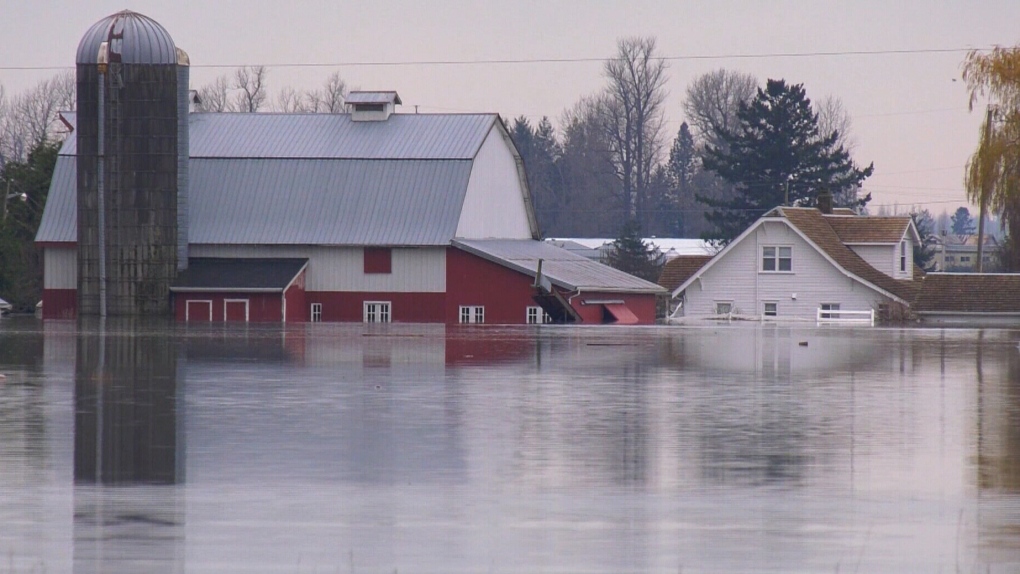Climate change made B.C. floods at least twice as likely, Environment Canada study suggests

Catastrophic floods that swamped much of southern British Columbia last fall were at least twice as likely because of climate change, suggests new research from Environment Canada.
The study, now undergoing peer review, concludes that the likelihood of similar events in the future will only increase as global warming continues to upend normal weather patterns.
“We do find substantial ongoing increases in the probability of these kinds of events,” said Nathan Gillett, an atmospheric physicist and manager of the Canadian Centre for Climate Modelling and Analysis.
In November, B.C. saw three events come together to create unprecedented flooding.
A so-called “atmospheric river” brought two days of drenching rain. It fell on already-sodden soil that couldn't absorb much more and was augmented by high temperatures that swelled bursting stream beds with snow melt.
The result was almost 15,000 people forced from their homes, major roads and bridges washed away and farms flooded in up to two metres of water. Landslides killed at least five people.
Insured losses have been estimated at $450 million; 600,000 chickens and 12,000 hogs died.
Gillett and his colleagues wanted to estimate the contribution of climate change to the disaster while it was still fresh in public memory. They turned to the science of climate attribution, which uses climate models to estimate the influence of one or more factors on weather events.
“We compared simulations with human influence and compared them with simulations without human influence,” he said.
The team worked with a group at Oxford University doing similar research. To ensure the results weren't influenced by quirks in any one model, the team used more than two dozen different ones. The results were consistent across all of them.
“All of the models show an increase in this kind of event in response to human-induced climate change.”
The team concluded that climate change had increased the odds of an atmospheric river like the one that swamped B.C. by at least 60 per cent.
“There's higher odds of this kind of atmospheric river event occurring now than there was back in the 19th century,” Gillett said. “Where there were two events before, now there's three.”
When the scientists factored in the other contributors to the disaster, they concluded that the odds of what happened to B.C. had been at least doubled by climate change, and may have been quadrupled.
And that's for the current climate, already affected by climate change. The chance of another catastrophe continues to increase as greenhouse gases keep entering the atmosphere.
“We expect that to increase as the climate continues to warm,” Gillett said.
Evidence keeps mounting that climate change is already causing damaging and extreme weather. Last summer, researchers at Oxford concluded the heat dome that brought unprecedented temperatures to B.C. and set the table for a wildfire that destroyed the village of Lytton would have been all but impossible without climate change.
Gillett said, if nothing else, the conclusions point to the need to rebuild roads and buildings that are able to withstand more severe weather than in the past.
“It's important to consider when we're rebuilding infrastructure how the risks of these kinds of events are increasing, and taking that into account.”
This report by The Canadian Press was first published Feb. 15, 2022.
CTVNews.ca Top Stories

W5 Investigates A 'ticking time bomb': Inside Syria's toughest prison holding accused high-ranking ISIS members
In the last of a three-part investigation, W5's Avery Haines was given rare access to a Syrian prison, where thousands of accused high-ranking ISIS members are being held.
'Mayday!': New details emerge after Boeing plane makes emergency landing at Mirabel airport
New details suggest that there were communication issues between the pilots of a charter flight and the control tower at Montreal's Mirabel airport when a Boeing 737 made an emergency landing on Wednesday.
Federal government posts $13B deficit in first half of the fiscal year
The Finance Department says the federal deficit was $13 billion between April and September.
Weather warnings for snow, wind issued in several parts of Canada
Winter is less than a month away, but parts of Canada are already projected to see winter-like weather.
Canadian news publishers suing ChatGPT developer OpenAI
A coalition of Canadian news publishers is suing OpenAI for using news content to train its ChatGPT generative artificial intelligence system.
Cucumbers sold in Ontario, other provinces recalled over possible salmonella contamination
A U.S. company is recalling cucumbers sold in Ontario and other Canadian provinces due to possible salmonella contamination.
Nick Cannon says he's seeking help for narcissistic personality disorder
Nick Cannon has spoken out about his recent diagnosis of narcissistic personality disorder, saying 'I need help.'
BREAKING Supreme Court affirms constitutionality of B.C. law on opioid health costs recovery
Canada's top court has affirmed the constitutionality of a law that would allow British Columbia to pursue a class-action lawsuit against opioid providers on behalf of other provinces, the territories and the federal government.
Real GDP per capita declines for 6th consecutive quarter, household savings rise
Statistics Canada says the economy grew at an annualized pace of one per cent during the third quarter, in line with economists' expectations.

































